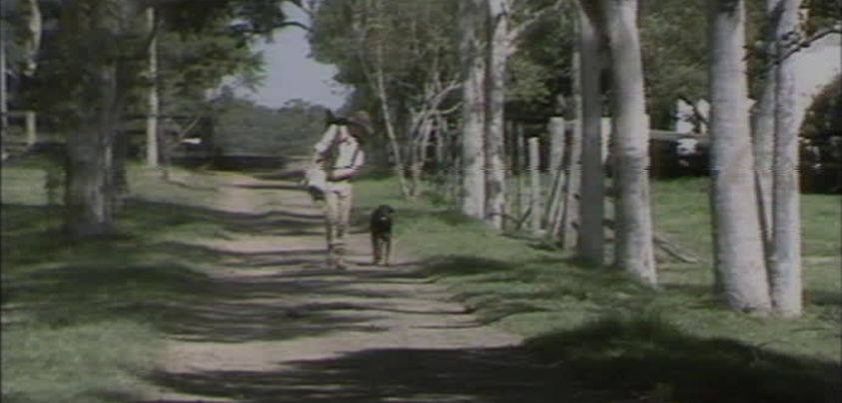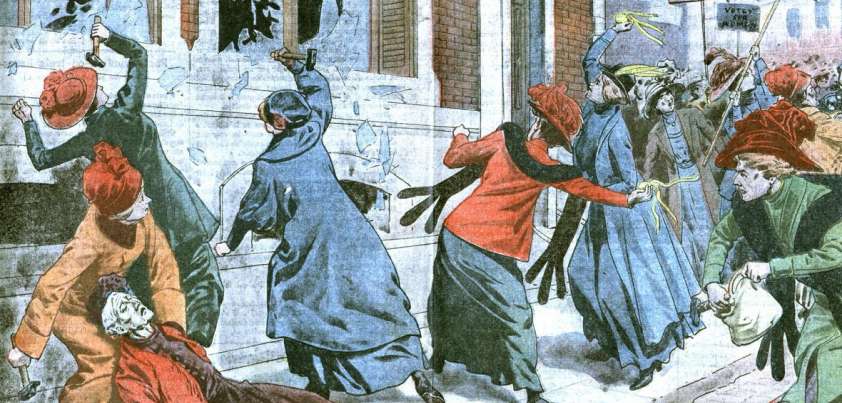 This story by Barbara Baynton paints a graphic picture of the isolation and dangers faced by women living in ‘outback’ Australia during the 19th century. A ‘swagman’ traveling the countryside looking for work visits a woman on a farm whose husband is away. She does not like the way he looks at her, and locks herself and her baby in their house. The man is about to break in when they hear a horse rider coming. The woman runs outside and calls for help. However, when the horse rider hears and then sees her, he races away in fright. More…
This story by Barbara Baynton paints a graphic picture of the isolation and dangers faced by women living in ‘outback’ Australia during the 19th century. A ‘swagman’ traveling the countryside looking for work visits a woman on a farm whose husband is away. She does not like the way he looks at her, and locks herself and her baby in their house. The man is about to break in when they hear a horse rider coming. The woman runs outside and calls for help. However, when the horse rider hears and then sees her, he races away in fright. More…
All posts by shortsonline
Daughter of Invention
 This entertaining story from Julia Alvarez begins by relating how a mother spends her limited free time trying to realize the Great American Dream by inventing improved household gadgets. Conflict arises over her daughter Yolanda’s inspired but controversial Teacher’s Day speech. Her father, whose family suffered bloody repression in his home country, ironically tears up the speech and demands a traditional, more respectful approach. His subsequent “make-up” gift of a typewriter symbolizes that the family “inventor” role has passed on to literary-minded Yolanda. Major themes: family relationships, cultural adjustment, freedom of expression, empowerment of women, pursuit of dreams. More…
This entertaining story from Julia Alvarez begins by relating how a mother spends her limited free time trying to realize the Great American Dream by inventing improved household gadgets. Conflict arises over her daughter Yolanda’s inspired but controversial Teacher’s Day speech. Her father, whose family suffered bloody repression in his home country, ironically tears up the speech and demands a traditional, more respectful approach. His subsequent “make-up” gift of a typewriter symbolizes that the family “inventor” role has passed on to literary-minded Yolanda. Major themes: family relationships, cultural adjustment, freedom of expression, empowerment of women, pursuit of dreams. More…
Hermann the Irascible (Story of the Great Weep)
 This story by Saki is a classic example of the use of reverse psychology to achieve a desired result… in this case, shutting down the women’s suffrage movement. The story first appeared in 1909 at the height of mass demonstrations of both men and women in support of the cause. I have seen some suggestions that the story trivializes women’s rights. This misses the point that Saki’s use of satire is so “over the top” here that, rather than mocking suffrage, the story highlights and supports it. Themes include human rights, tyranny, manipulation through excess. More…
This story by Saki is a classic example of the use of reverse psychology to achieve a desired result… in this case, shutting down the women’s suffrage movement. The story first appeared in 1909 at the height of mass demonstrations of both men and women in support of the cause. I have seen some suggestions that the story trivializes women’s rights. This misses the point that Saki’s use of satire is so “over the top” here that, rather than mocking suffrage, the story highlights and supports it. Themes include human rights, tyranny, manipulation through excess. More…
The Leap
 This Louise Erdrich story about the relationship between a former blindfold trapeze artist and her daughter involves three leaps. The first is the tragic failed leap that resulted in the deaths of the woman’s first husband and their unborn child. The second is the successful leap through which the mother saves the then seven-year-old girl from a house fire. The third is a leap of time. The now elderly mother is physically blind and requires her daughter’s help to engage her passion for books and reading. Themes: choice & consequences, mother-child relationships, love, courage, trust, aging, the joy of reading. More…
This Louise Erdrich story about the relationship between a former blindfold trapeze artist and her daughter involves three leaps. The first is the tragic failed leap that resulted in the deaths of the woman’s first husband and their unborn child. The second is the successful leap through which the mother saves the then seven-year-old girl from a house fire. The third is a leap of time. The now elderly mother is physically blind and requires her daughter’s help to engage her passion for books and reading. Themes: choice & consequences, mother-child relationships, love, courage, trust, aging, the joy of reading. More…
Transactions in a Foreign Currency
 In this story by Deborah Eisenberg, a twenty-eight-year-old woman decides to end her relationship with a lover she has been seeing on and off for almost ten years. The man, who hasn’t contacted her for six months, calls and asks her to drop everything and spend a few weeks over Christmas with him in Montreal. Like many times before, she readily agrees. Some experiences while he is away for a few days help her realize that it is time to let him go. Themes include love, passivity, commitment, selfishness, letting go. More…
In this story by Deborah Eisenberg, a twenty-eight-year-old woman decides to end her relationship with a lover she has been seeing on and off for almost ten years. The man, who hasn’t contacted her for six months, calls and asks her to drop everything and spend a few weeks over Christmas with him in Montreal. Like many times before, she readily agrees. Some experiences while he is away for a few days help her realize that it is time to let him go. Themes include love, passivity, commitment, selfishness, letting go. More…